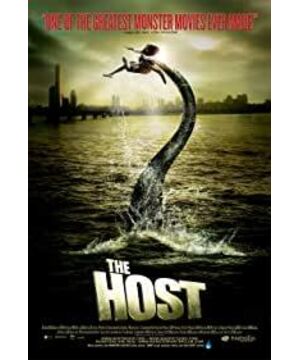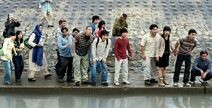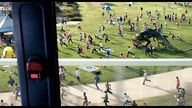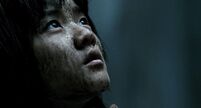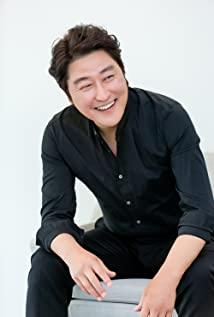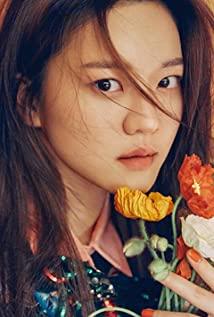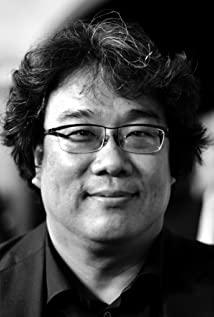"Open Bong Joon-ho's Correct Posture"
1. Regarding Feng Junhao's personal resume and awards for his works, you can Baidu by yourself. This article only picks the important ones, and ignores those copied and pasted things. I don't think that is important.
2. Correct viewing order: "Kidnapping the Door Dog" (2000), "Memories of Murder" (2003), "Monster on the Han River" (2006), "Snowpiercer" (2013), "Parasite" (2019)
3. The main line of thought in Feng Junhao's works is to pay attention to the disadvantaged and the bottom people; it reflects the reality of strong inequality in a hierarchical society; the expression method is to use small families to represent everyone, and kindness to contrast indifference. No matter what type of film Feng Junhao makes, the core is the same, and what I admire most about Feng Junhao is that he can always achieve an excellent combination of commerciality, artistry, and reality. He is the theme he wants to express. One of the most commercially successful directors in China. He did not completely turn to literary films and documentaries, but in the fierce competition of commercial films, he took a curved road to save the country. He was not an ascetic, but he did what he could not do by ascetic and abhorrent - to save himself and others . Feng Junhao's "Kidnapping the Dog at the Door" was a big hit. Since then, he has delved into the art of commercialization, so we have seen "Memories of Murder", "The Monster of the Han River", "Snowpiercer", and "Parasite" one after another. One success, one peak after another. There are many factors behind Bong Joon-ho's success. I think the most important factor is that he is a director who knows what the audience wants and shoots, rather than a director who can watch whatever I want. Why is "1942" directed by Feng Xiaogang not well received? It's not because of how bad the movie is, there are many worse movies than this one, but there are too many bad movies that performed better at the box office than "1942". The box office of "1942" is less than 400 million yuan. The key is that the audience does not buy what and how the film "1942" is intended to express, so I won't discuss it here. On the other hand, Feng Junhao's works are close to the audience, even if they don't understand the intention or insinuation, they can still be a good story, not boring, not preaching, not stereotyped. That's why Feng Xiaogang was chattering because the box office of "1942" was not good. In fact, he should ask himself, the audience is not happy, is his posture wrong?
4. Now I will introduce you to the correct posture when having a relationship with "The Monster of the Han River".
5. The first step is to learn the mental method - re-read the third article. If you want to understand "The Monster of the Han River" or any of the works directed by Bong Joon-ho, you can read the third article first.
6. In the second step, the Jade Girl is ready, and the "Jade Girl Heart Sutra" is also read, then the next step is to take off. We have to clear the fog first before we can see the true face of Mount Lu. The movie "Monster of the Han River" can be said that every character exists or even a certain character is missing, and everything refers to it. There is only what you don't understand, and there is no superfluous. But before undressing, look at the taste of the clothes, right?
"Kidnapping the Door Dog" (2000) featured three actors in "The Monster of the Han River", namely Byun Hee-bong, Bae Doo-na, and Go So-hee. Among them, Bian Xifeng and Pei Douna are the main actors, and Gao Suxi cameo as a nurse who was kidnapped by Song Kanghao with a needle tube. "Memories of Murder" (2003) featured five actors in "The Monster of the Han River" (2006): Song Kang-ho, Byun Hee-bong, Park Hae-il, Yoo Seung-mok, and Lee Jae-young. Since "Memories of Murder", Song Kanghao has become a royal actor directed by Feng Junhao. All of Feng Junhao's milestone works must have Song Kanghao starring and achieve each other. "The Monster of the Han River" may not be so exciting if it is not starring Song Kanghao! Song Kangho and Gao Yaxing in "The Monster of the Han River" later appeared in "Snowpiercer" (2013), and Gao Yaxing played the role of Song Kanghao's daughter Hyun Shu in "The Monster of the Han River", and they played father and daughter again in "Snowpiercer", and this She lived to the end. Song Kang-ho again starred in the Oscar-winning film "Parasite" (2019) in 2019. Just like the quality of clothes reflects taste, Feng Junhao is indeed very discerning in the selection of actors.
Bian Xifeng plays Kang Doo's father, Xifeng, a somewhat exaggerated but amiable old man. Most of them were born before and after the Korean War. They experienced the war years, the military government period, and the economic boom period called the "Han River Miracle". It is a living dictionary of modern Korean society. He will bribe the police when they don't believe the eldest son Kang Doo says granddaughter Hyun Shu is alive, and bribe corrupt officials again when they pass the inspection to enter the blocked Han River area, of course he will shoot, his age doesn't need to obey Military service uses guns. The old people's peace of mind hides the love for their offspring and the pity for being human, forcing them to be the least afraid of death, because they themselves are the closest to death. Even though his son Kang Doo miscalculated the number of bullets, he handed him the gun that actually had no bullets. Facing the monster, he pulled the trigger and found that there were no bullets. Instead of cursing Kang Doo, his father waved back to his son and ran away. Express your regret that you cannot continue to protect your children.
Bae Doona's father is the vice president of Pulmuone, a large food company in South Korea (Pulmuone), and her mother, Kim Young-hwa University, graduated from Ewha University, a prestigious university. Pei Douna herself is a real daughter of gold. With a good family background, education, and her arrogant and strong personality, she has become a powerful acting school. In the play, Pei Doona spent three months practicing archery skills, and she did all the archery scenes herself without a substitute. Kang Doo's younger sister, Nam Joo, played by Bae Doo Na, was born in the era of economic boom. She is the family's greatest hope. She dreams of changing her destiny through competition and making her relatives live a better life. Why is Nam Joo an archer in the movie? "Zhou Li Bao Shi": "To raise the son of the country with the Tao is to teach six arts: the first is five rituals, the second is six music, the third is five shooting, the fourth is five imperialism, the fifth is six writing, and the sixth is nine counting. Refers to six skills: ritual, music, archery, imperialism, calligraphy, and arithmetic. The "shooting" of these six arts is currently in the Chinese cultural circle, and only South Korea has preserved it as a tradition. Archery is a basic course in South Korea since elementary school It is a veritable Korean "national art", a real national sport, and its status in Korean sports is equivalent to China's table tennis. But even if table tennis is regarded as a "national ball" in China, There is no compulsory or basic course from elementary school to university. In the film, Nanzhu only won the bronze medal because she opened the bow too slowly. When escaping, everyone else ran into the car at the fastest speed, and she didn't seem to be in a hurry at all. I was in a hurry and dragged her. The first time I faced a monster, the arrow was knocked out before it could be fired. This is a typical feature of the decadent generation in Korea at that time. Why is this? Because they were not taught what to do and what not to do. What, what they want to do and like is always ignored, their lives are designed by their parents, and unapproved lives are cursed, so just wait, anyway, someone will always "notify" you.
Park Hae-il's second son, Nam-il, is the only college student in the family but doesn't have a job. Although he blames his brother (Kang Doo, played by Song Kang-ho) for drinking, he is also a little alcoholic. He came with a bottle for the first time. Nan Ri was the one who went to college after all, he was the only one who questioned the evacuees, he was the only one who reminded Kang Doo to cover his yellow hair when he entered the government checkpoint on the Han River, and he was the only one who discovered the hiding place of his niece Hyun Shu. He is the main force of various contemporary movements in South Korea, including democratization of course. He is very good at protests and demonstrations, whether shooting or making Molotov cocktails. Because of this, although he dedicated his youth to his ideals and the future of the country, the people and the country do not remember him except for collecting money.
7. After reading the taste of clothes, you still need to flirt, such as playing some background music.
There are 2 important backgrounds for the birth and success of this film.
The first is the film industry background. In order to protect the development of national films, according to Liszt's "Theory of Protecting Infantile Industries", South Korea implements a "film quota system" to resist the impact of Hollywood and protect the domestic film industry. According to the "Film Promotion Act" implemented in 1966, the Korean Ministry of Culture and Tourism mandates that Korean cinemas must show a certain number of local movies in each hall every year, and Korean TV stations must also broadcast a certain number of hours of domestic movies. Since 1984, the South Korean government has abolished the pre-censorship system. In 1985, the South Korean legislature revised the "Republic of Korea Film Act", which clearly stipulated that the number of days that Korean movie theaters broadcast Korean movies every year was 146 days, reaching 40% of the number of movie days in the year. . In 1996, the film classification system was implemented, which stipulated that films were divided into five grades: all people, 12 years old and above, 15 years old and above, and 18 years old and above can watch and restrict screening. Quota system and rating system are the two major institutional advantages of the rapid development of Korean films. The maturity of the environment required for film development allows director Bong Joon-ho to show social reality and reflect social emotions to a greater extent. In 1999, the Korean film SHIRI ("Life and Death") became a monumental production in the history of Korean film, breaking the box office myth of the Hollywood blockbuster "Titanic", and Korean filmmakers were excited by it. Influenced by this, the Korean government decided to support the film industry. , and raised $200 million as seed funding to establish 20 film funds. In 2003, with Roh Moo-hyun coming to power, South Korean director Lee Chang-dong became the Minister of Culture and Tourism of South Korea. His appointment was regarded as a victory and glory for the Korean film industry. In order to successfully sign free trade agreements with the United States and other countries, the Korean government decided (Bei) (po) to reduce the quota of domestic films. On January 26, 2006, South Korean Deputy Prime Minister and Minister of Finance and Economics Han Deok-soo stated at a press conference that a new quota system for domestic films will be implemented from July 1, 2006, reducing the number of days that domestic cinemas are obliged to play domestic films each year to 73. Days, at the Berlin Film Festival in February 2006 and in May 2006, many Korean film directors and stars made a final protest in whatever way they could. "Monster of the Han River" was chosen to be released in South Korea on July 27, 2006. It was just when the new quota system was implemented. Director Bong Joon-ho used practical actions to tell the Korean people that Korean movies are not afraid of Hollywood and the new quota system! [Postscript: As a result, "Monster of the Han River" has maintained the top spot in the Korean box office for six years since its release, and it was not until 2012 that "League of Thieves" overtook it by a small gap! 】
The second is the political and social background of South Korea at that time: after the Roh Moo-hyun government came to power in 2003, it proposed to establish an equal and mutually beneficial relationship with the United States, be kind to its neighbors, actively participate in international affairs, increase South Korea’s international influence, and strongly opposed the United States’ sanctions against North Korea. And the use of force, and the removal of the pro-American foreign minister. Roh Moo-hyun also insisted that the U.S. military withdraw from Seoul (then Seoul Mayor Lee Myung-bak changed Seoul to Seoul in 2005) to take back the wartime command from the U.S. military and realize national defense independence. Roh Moo-hyun also advocated the implementation of the North-South Peace and Prosperity Policy, which is essentially the development and extension of President Kim Dae-jung's Sunshine Policy, while fighting domestic corruption and developing the economy. Roh Moo-hyun is the real South Korea's first democratically elected civilian president, and his governance policies represent the voice of the Korean people. Like the U.S. military stationed in Japan, the US military stationed in South Korea has always had rape and murder cases, child molestation cases, or other incidents that cause harm to the Korean people, and they are basically acquitted, causing strong opposition from the Korean people, and frequent protests and demonstrations. . Among them, the most sensational is the extremely brutal rape and murder of South Korean woman Yin Jinyin by US soldiers in 1992 (self-Baidu, unable to describe), the criminal Kenneth L. Markle was sentenced to life imprisonment (American father did not protect, you said How serious), but it was soon reduced to 15 years, and to make matters worse, the early release of Markle in 2006 was unacceptable to the Korean people, and mass protests broke out. The US government's disrespect and bullying towards South Korea is even more deeply rooted, from the president (Roh Moo-hyun) to the civilians who are all indignant. Under the strong pressure of the South Korean government and people, the United States withdrew about one-third of its U.S. troops stationed in South Korea in early 2006, and handed over a number of tasks and tasks, including patrols in the Korean demilitarized zone and maritime borders. The results of independence have in turn stimulated the public's opposition to the U.S. military stationed in South Korea and the expectation of an early withdrawal of all U.S. troops stationed in South Korea. At the beginning of the film, the Korean officers in the morgue of the US military base were forced to dump the highly toxic formalin into the sewer by their American bosses, which is a real incident.
The progress of the anti-American issue further reflects the shortcomings of the Roh Moo-hyun government on economic issues. In 2006, South Korea's economy was indeed not good, with rising prices and unemployment, and the gap between the rich and the poor continued to widen instead of narrowing. dissatisfaction with economic performance. Therefore, Bong Joon-ho's "Monster of the Han River" truly reflected various social emotions in South Korea at that time.
8. The flirting little music is also played, so let's go straight to the topic. What is the theme of this movie? .
First, the Han River is to South Korea what the Yellow River is to China, so the Americans forced South Korean medical officials to pour formaldehyde into the Han River, and later, in the name of poisoning monsters, used South Korea’s mother, the Han River, as a testing ground for biological and chemical weapons. Refers to the disrespect and continuous poisoning of Korean culture by American culture;
Second, the American poisoning led to the mutation of monsters. The Americans said that there was a virus and they would conduct human experiments on Koreans (Kang Doo played by Song Kanghao), and the Americans had to poison the Han River for the second time in the name of poisoning monsters. Once the Han River within tens of kilometers is released, no creatures will survive. In the end, it is the Americans who say that there is nothing, which is a misunderstanding. When Kang Doo (played by Song Kangho) kidnapped the female nurse from the so-called wartime hospital, we found out that it was just a temporary medical center in a container. Koreans were not even qualified to enter the hospital or the base for surgery. The people outside the container were actually in the BBQ. Have a dinner party, have a lot of fun, and don't care about the life and death of monsters and Koreans! The anti-American sentiment against U.S. extraterritoriality is clearly on paper. To put it mildly, it is against the unequal diplomatic relations between South Korea and the United States, and calls for the establishment of a new South Korea-U.S. relationship featuring equality, respect, mutual benefit and mutual trust;
Third, Americans are heroes when they are righteous and brave. Kang Doo, played by Song Kangho, fought side by side with the Americans, but no one mentioned it. Instead, he became a wanted criminal; the Korean government did nothing in the face of monsters. It is more enthusiastic than catching monsters. As long as bribes are offered in the blockade area, even the most wanted criminals in the country can enter. The official hinted that the face of asking for bribes seems to be back to the Japanese occupation period, and the Korean government can’t even do the civil war, because they are even ordinary people. Wanted criminals can't be caught, can they be expected to protect the people? When the unarmed demonstrators were attacked, they were ruthless and worked very hard! Despite the opposition of the people, the South Korean government would rather use the water source of the capital as a biological and chemical weapons testing ground for the Americans, and actually agreed to the request of the U.S. government to poison the Han River again. American! Kang Doo's daughter Hyun Shu, played by Song Kang Hao, called. When Nan Ri asked to follow up the phone, the police responded that they would not do it casually. Turning a deaf ear to the request and treating ordinary people like interrogating criminals, this is in stark contrast to the Korean government's kneeling and licking of the US government! Let the audience see that the U.S. government can command the South Korean government, in the final analysis, it is due to the weakness and corruption of the South Korean government itself.
Fourth, Kang Doo's family has a characteristic. They are all single, without a mother, without a wife. The mother, wife, and partner are all representatives of love, indicating the lack of love, but their lack of love does not mean that they will not love others. The Kang Doo family loves each other and is happy, and their family is also full of enthusiasm for others. Kang Doo, played by Song Kangho, is willing to help others when he sees a monster, willing to fight back with the American, and willing to risk his life to save people many times! His daughter Xuan Shu, who was still sad about the death of others when she was in danger, was still willing to come forward to save the little boy, and sacrificed herself at the last moment to protect the little boy so that he could survive! After losing his beloved daughter at the end, Kang Doo played by Song Kangho did not hate others or society, but silently adopted the little boy saved by his daughter. Their family is kind-hearted. Kindness is a virtue, but the kindness of a person is insignificant, and the kindness of a family is also insignificant. If you want a spark to become a prairie prairie, you must awaken the kindness in the hearts of others. Indifference is the darkness before the dawn of kindness. In the indifferent night, the birth is mostly tragedy. When the Americans were fighting back against the monsters, only Kang Doo was willing to come forward, but their actions did not wake up the numb passers-by; when Kang Doo's family rescued their relatives: police ignored, officials demanded bribes, friends set traps for bounties , National wanted, underworld looting, monster killed Dad, their enemies are not just monsters, but also the indifference of others. Is there no hope? No, there will always be a few stars left in Bong Joon Ho's movies. When Nan Ri woke up, the homeless man he met was Huo Lei Feng from South Korea, two people who never knew each other. The tramp didn't want any money. He helped Nan Ri reach the bridge where Xuan Shu was, and poured gasoline into the monster's mouth at the critical moment. Kindness from the bottom of my heart. And this homeless person may have participated in protests and demonstrations, and is no stranger to making Burning D, so don't judge people by their appearance, he may also have a glorious past, don't turn away people thousands of miles away, he may be the one who helps you. But kindness did not bring good news. Xuan Shu still died, but the saddest thing was not that Xuan Shu died, but that she was not killed by a monster, but by a police gun! Look at the two bullet holes on Xuanshu's daughter's back, that's the stare of Satan... In such a society, after all, a person, a man, tried his best, but still failed to protect his family, relatives, daughter... …
Kang Doo, maybe resentment, maybe despair, maybe revenge, but he didn't. He lives with the little boy saved by his daughter, and the two re-form a family of father and son, silently passing on love and kindness in an indifferent society, and kindness has not changed. If there is a change, it is that he has turned his hair back to black, and has a gun on hand. If you love him, you must protect him. At the critical moment, you can only protect your loved one by yourself. Although it is illegal to carry a gun, sometimes How can you protect it if you don't violate F? Or have a gun to make yourself feel more at ease.
Fifth, define the hero again. Kang Doo is a father who can lose his biological daughter by running and running, and gave his father a gun without bullets, but Kang Doo's father, holding a gun without bullets, was knocked down by the monster first and then again. Being thrown to death by a monster with her tail, Kang Doo's younger sister Nam Joo was the runner-up in the archery competition, but when she faced the monster for the first time, she was knocked flying and fell into the ditch without firing an arrow. Kang Doo's younger brother threw a lot at the monster Burning Ping actually failed to hit a single shot, and the most critical shot actually fell off and fell behind him, almost didn't burn himself, right? It is such a family that killed the monster that the government failed to kill, seeking the psychological shadow area of the monster. How did they do it? In fact, it is very simple, it is the instinct of protection. When external conditions trigger this instinct, everyone can be a hero. The biggest difference between the heroes directed by Feng Junhao and most of the heroes in Western films is that they are mortals, they will make mistakes that ordinary people make, and they also have moments of helplessness and incompetence in life, they will not kill all the way until the enemy is eliminated. , they will also fail, and even have a failed life, they may be any image you usually hate and despise. Some people say that those who can withstand the pressure of life and live strong are heroes, of course not! Heroes are civilians, which does not mean that every civilian is a hero. If it is said that, one of a billion sperm penetrates into an egg and gives birth to a life, then this sperm is a hero, and we are all descendants of heroes. People who can withstand the pressure of life and live a strong life are ordinary social animals. This is the instinct of survival. What needs to be stimulated to become a hero is the instinct of protection. Heroes are scarce and unstable. The heroes directed by Bong Joon-ho have never set a lofty ambition to become a hero since childhood. They just wanted to live the life of ordinary people. They tried their best to make their lives ordinary and ordinary, but fate has repeatedly changed. Pushed toward the extraordinary, even at the expense of taking what they hold most dear to fuel their guardian instincts, they are forced to become heroes in the eyes of others. However, in their own eyes, they are not heroes, does Kang Doo think he is a hero? No, Kang Doo sees himself as a sad and incompetent father who has lost his daughter, just an orphan with no father, no mother, no wife and no children, just the adoptive father of a little boy... We can't be sure who fate chooses to be a hero, The only certainty is that the hero must be alone. The hero directed by Bong Joon-ho is the kind of ordinary person who is suddenly stimulated to become a hero by his protective instinct, and then hides his merits and fame and disappears into the crowd. It is very oriental. You won't see Superman, Captain America, Batman in your life, and you can't be Spiderman, Ultraman, 00
At the end, Kang Doo, played by Song Kang-ho, was eating with the rescued little boy, when news came on the TV (the picture was of an American speaking): "Washington's U.S. House of Representatives Investigative Committee released its findings on the virus situation in South Korea: recently What happened in South Korea was wrong..." During the process, no one watched TV. said the little boy. "There's nothing to see." Kang Doo said, "Do you want to change the channel?" At this time, the TV came: "No virus was found..." The little boy said, "Turn it off, and concentrate on eating." Kang Doo nodded, Lift your leg and use your toes to turn off the TV. Yes, the news is all about P. For P people, only concentrating on eating is the most practical. Your stomach will not lie to you, and your body is the most honest. This is the most real helplessness, when you know you can't change it, you are numb.
This is Feng Junhao's "Monster of the Han River": This is a story of criticism and irony, a story of loneliness and heroes, a story of indifference and kindness, a story of protection and counterattack, and a sad story And the story of helplessness, this is a story of moving forward with a heavy burden.
[Postscript] The monster didn't want to come to this world by himself, just like a human being. No child is born when the parents consult the child. Monsters eat people to survive, and people protect themselves to survive. So, whose fault do you think this is? (If you say who made the monster is whose fault, then who do you say made the American medic? Keep asking...)
View more about The Host reviews


